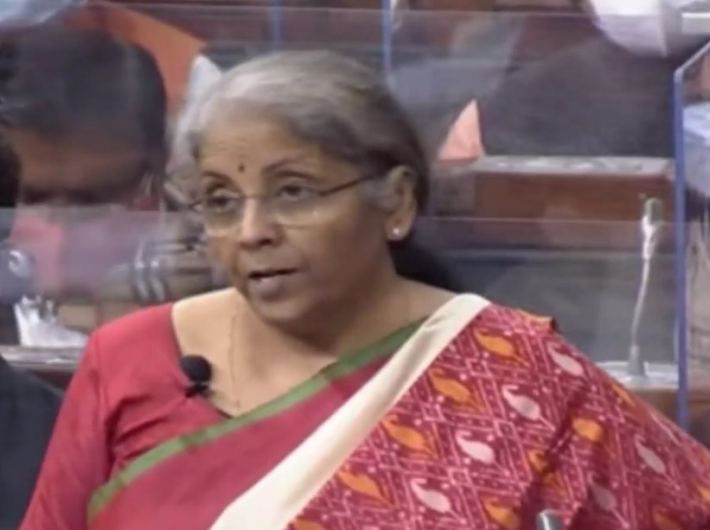Union Budget: Fiscal deficit pegged at 9.5% of GDP in re 2020-21, Amendment to the FRBM Act; target to reach fiscal deficit level below 4.5% by 2025-26
In the budget speech on Monday, finance minister Nirmala Sitharaman drew the attention of the Parliament on the fact that the pandemic’s impact on the economy has resulted in a weak revenue inflow. This was combined with high expenditure to provide essential relief to vulnerable sections of the society especially the poor, women, SCs and STs.
Revised Estimates (RE) 2020-21
“We opted for a series of medium-sized packages during the pandemic so that we could calibrate and target our response according to an evolving situation. Once the health situation stabilised, and the lockdown was being slowly lifted, we switched to ramping up Government spending so as to revive domestic demand,” Sitharaman said. As a result, against an original Budgetary Estimates (BE) 2020-2021 for expenditure of Rs 30.42 lakh crore, the Revised Estimates (RE) 2020-21 are Rs 34.50 lakh crore. The Government has maintained the quality of expenditure. The capital expenditure, estimated in RE 2020-21 is Rs 4.39 lakh crore in 2020-2021 as against Rs 4.12 lakh crore in BE 2020-21.
The finance minister informed the parliament that the fiscal deficit in RE 2020-21 is pegged at 9.5% of GDP. It has been funded through Government borrowings, multilateral borrowings, Small Saving Funds and short term borrowings. Another Rs 80,000 crore would be needed for which we would be approaching the markets in these two months, the Finance Minister added.
Budgetary Estimates (BE) 2021-22
To ensure that the economy is given the required push, Sitharaman said that the BE 2021-22 for expenditure is Rs 34.83 lakh crore. This includes Rs 5.54 lakh crore as capital expenditure, an increase of 34.5% over the BE 2020-2021.
The fiscal deficit in BE 2021-2022 is estimated to be 6.8% of GDP. The gross borrowing from the market for the next year would be around ' 12 lakh crore.
Borrowing for the States
Sitharaman said that in accordance with the views of the 15th Finance Commission, the Government is allowing a normal ceiling of net borrowing for the States at 4% of GSDP for the year 2021-2022. A portion of this ceiling will be earmarked to be spent on incremental capital expenditure. Additional borrowing ceiling of 0.5% of GSDP will also be provided subject to conditions. States will be expected to reach a fiscal deficit of 3% of GSDP by 2023-24, as recommended by the 15th Finance Commission, the she added.
Extra Budgetary Resources
The Finance Minister said, “In the July 2019-2020 Budget, I introduced the Statement 27 on Extra Budgetary Resources – it disclosed the borrowings of Government agencies that went towards funding the Government of India schemes, and whose repayment burden was on the Government. In my 2020-2021 Budget, I enhanced the scope and coverage of the Statement, by including the loans provided by Government to the FCI. Taking a step further in this direction – this year, in RE 2020-2021, I propose to replace the NSSF loan to FCI for food subsidy by making budget provisions, and continue with the same in 2021-2022 BE.”
Amendment to the FRBM Act
The Finance Minister said, “We plan to continue with our path of fiscal consolidation, and intend to reach a fiscal deficit level below 4.5% of GDP by 2025-2026 with a fairly steady decline over the period. We hope to achieve the consolidation by first, increasing the buoyancy of tax revenue through improved compliance, and secondly, by increased receipts from monetisation of assets, including Public Sector Enterprises and land.”
Sitharaman informed the Parliament that she will be proposing an amendment to the FRBM Act towards achieving Central Government fiscal deficit along the broad path indicated above.
Devolution to the States
The Finance Minister recognised the commitment to fiscal federalism and said that the Government would be retaining the vertical share of the States at 41% as per the recommendations of 15th Finance Commission. Jammu and Kashmir, in the 14th Finance Commission, was entitled to devolution being a State. Now, the funds to the UTs of Jammu and Kashmir and Ladakh would be provided by the Centre.
Smt. Sitharaman has also provided, on the Commission’s recommendation, Rs 1,18,452 crore as Revenue Deficit Grant to 17 States in 2021-2022, as against Rs 74,340 crore to 14 States in 2020-2021.
